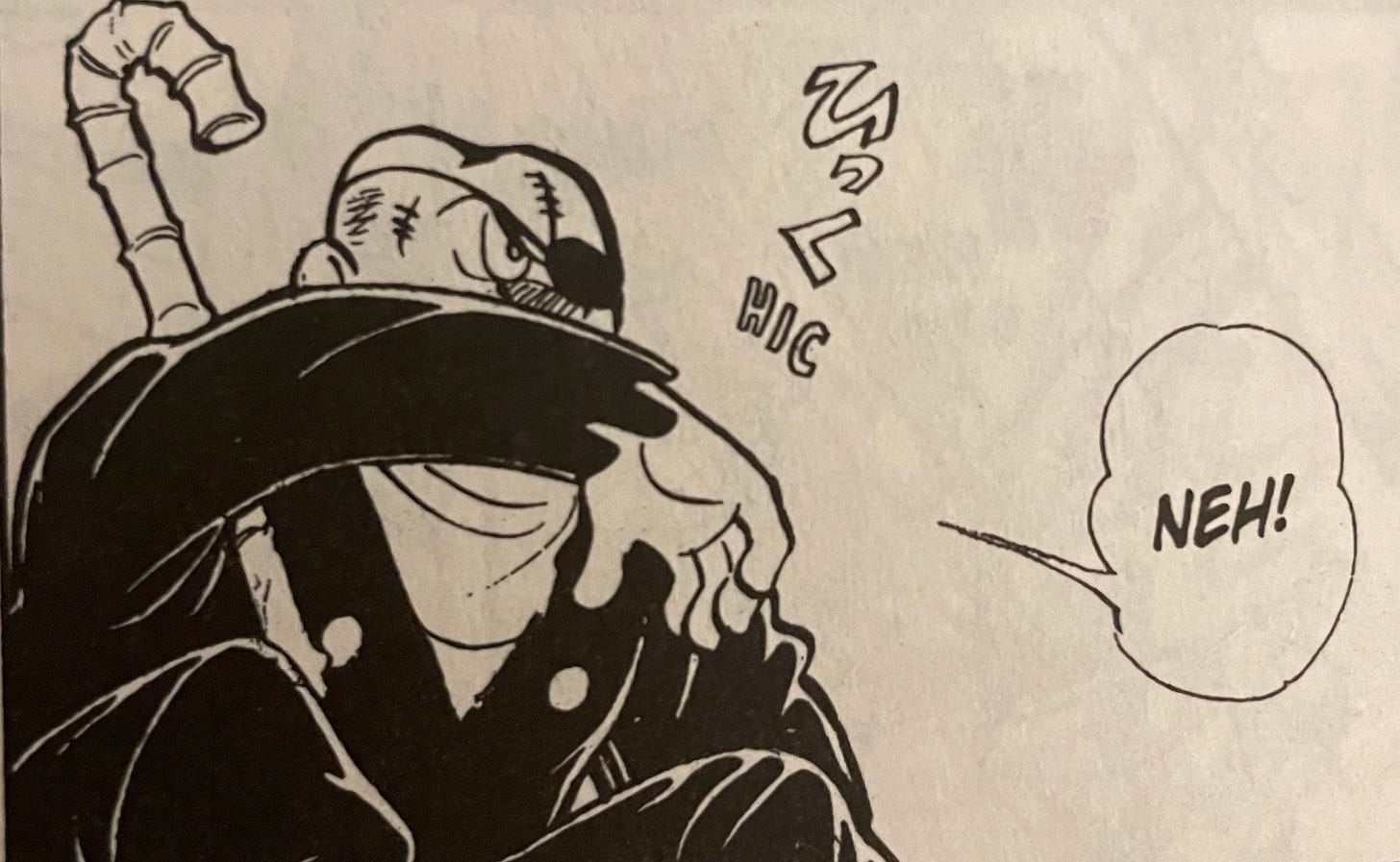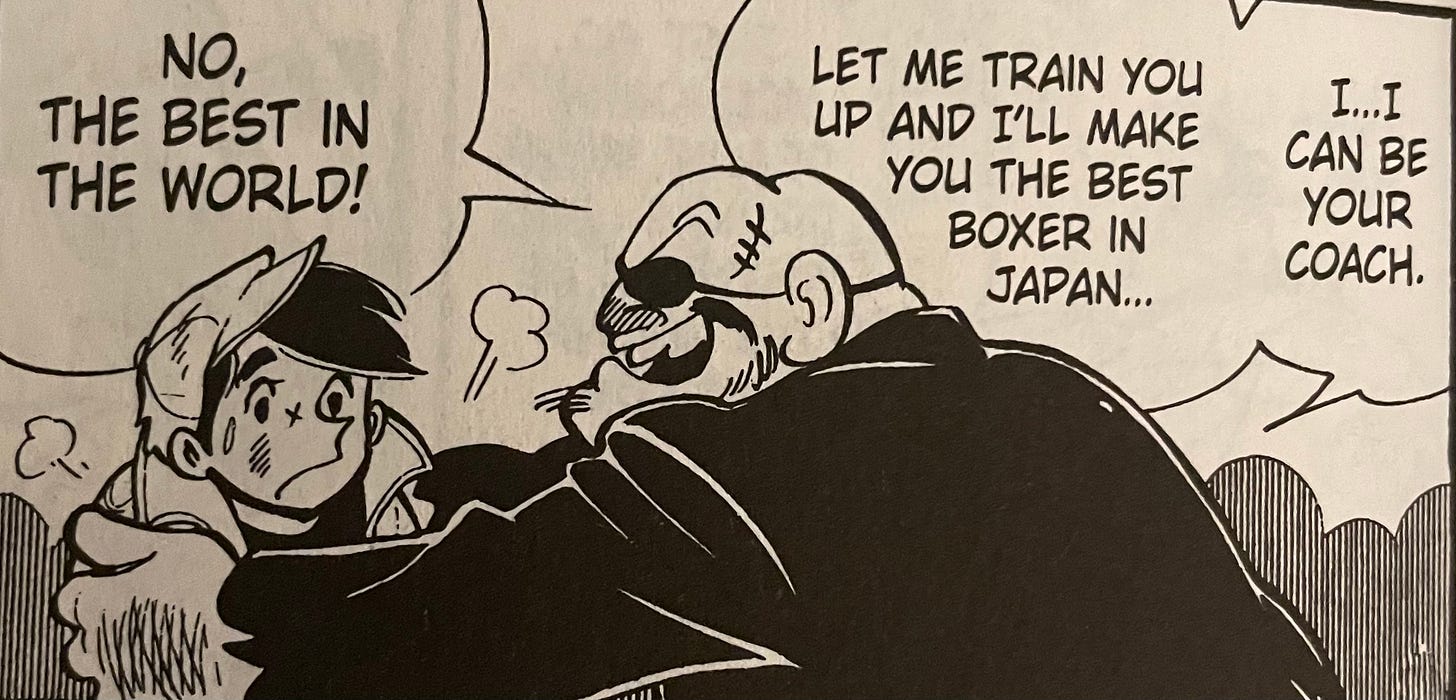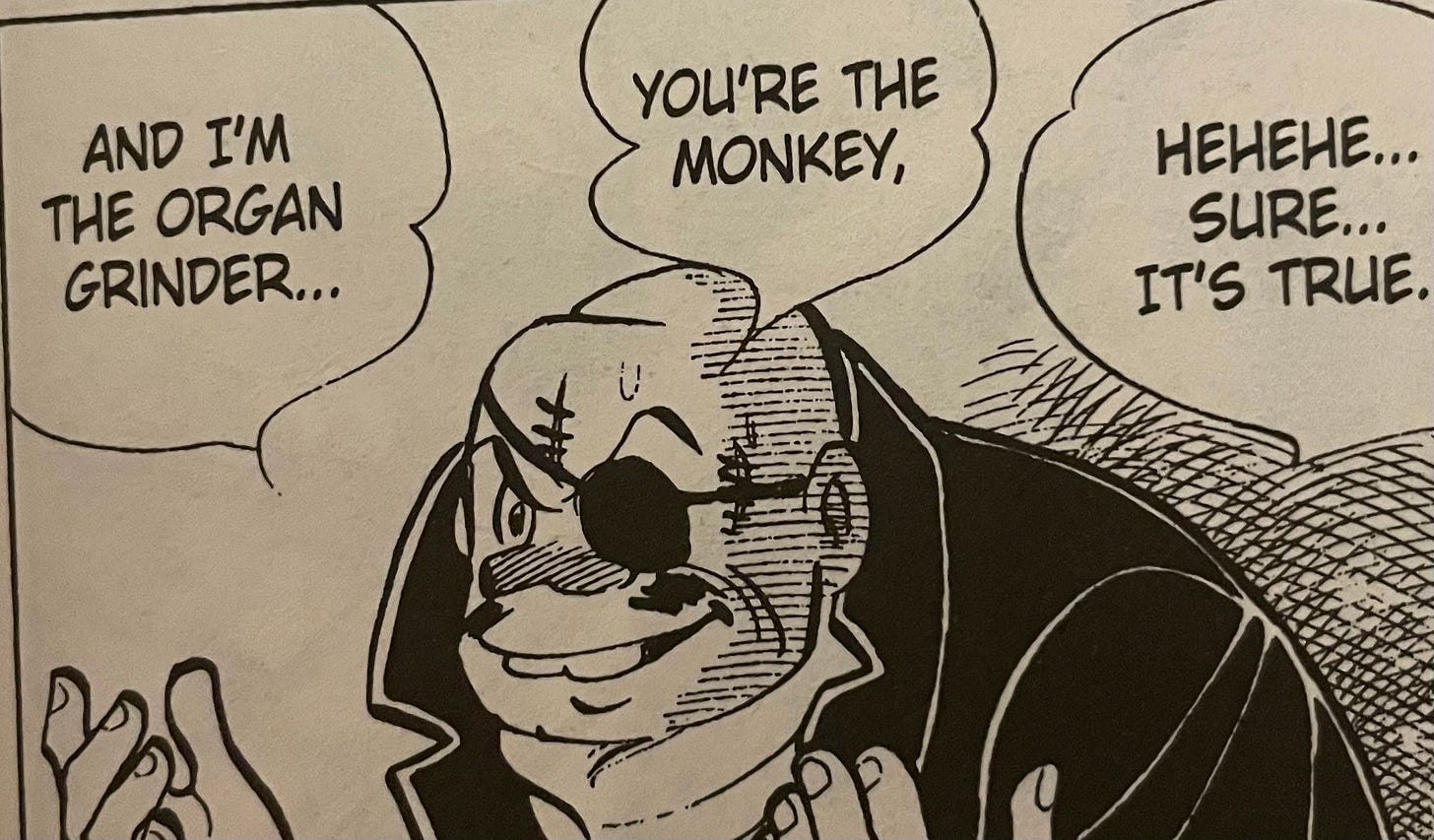Ashita no Joe: The Flawed Mentor
A benevolent teacher? No... that's just what they'd expect us to do.
Preface!
I talked about how much Ashita no Joe had been hyped to me in my first post on the series, but that entire post was essentially primarily about Joe Yabuki, the protagonist of the series. Outside of him there is so much to pay attention to. Even if Joe is the star player, it’s a close second place for Danpei, the focus of today’s post.
Now, I almost made this a “One Great Character” about Danpei, but he’s more than that, honestly. In just one volume, he’s taken his character archetype and simultaneously broken it and enhanced it. That’s pretty great.
Not just that, but Danpei’s character design is exactly what I needed it to be. He’s a gruffy looking dude with an eye patch and a mustache to match. Oops, I’ve digressed into gushing. Onward!
Preface over.
If you’ve read, or are vaguely familiar with Joseph Campbell’s Hero of a Thousand Faces, you’ll have a head start on where I’m going with this, but to summarize, Campbell lays out the various character archetypes that are found across countless stories.
For the purposes of today, we’re going to look at the Mentor character, who Campbell describes as “an old crone or an old man who provides the adventurer with amulets against the forces they will pass.” Their job is to prepare the hero for the adventure, to supply them with all the training and resources they need to succeed.
And in most cases, the mentor is an altruistic role. Obi-Wan is perhaps the best example of a mentor character. Looking at his role in the original Star Wars trilogy, he is a selfless old man whose sole job is to train Luke to defeat Darth Vader. He even gives his own life—on purpose—to light a deeper fire in Luke.
What did Obi-Wan want out of this? What did he stand to gain personally? Not much. I mean, he literally threw his life into Vader’s lightsaber just so Luke could see it.
But what happens when a mentor has an ulterior motive? That’s where Danpei, from Ashita no Joe, enters the story.
Before we get into Ashita no Joe, here’s what you need to know.
Joe, an upstart teenager with a penchant for dropping the fisticuffs, has come to town and Danpei, a bum, more or less, has taken a fancy to him. He keeps insisting on training Joe to be a boxer, to rise to the top. Danpei used to be a boxer himself, but injuries sidelined him. Then he became a trainer, but never had the right student. Now that he sees Joe, he sees the hero he wants to train, but Joe is reluctant to give in.
But even in the face of Danpei’s insistence, a deeper truth emerges, and it’s that Danpei may not be the mentor we’re used to.
And that’s all you need to know.
Danpei is the obvious mentor character. As obvious as it gets. He’s literally an old man, like Campbell described, whose sole purpose is to raise the hero and provide him the tools to succeed. And he does that. Even with Joe refusing to accept Danpei as a mentor, Danpei continues to send him post cards while Joe is locked away in juvie, describing new boxing moves.
But again, Ashita no Joe doesn’t leave the mentor character as is, the same way they don’t leave Joe as that typical delinquent fighting for a deeper need for freedom. Danpei has an ulterior motive that makes him quite the interesting mentor character—he is looking out for himself, through training Joe.
Very early on, Danpei lets us in on the truth—he wants to train Joe so that he can become rich and famous himself. He’s using Joe to elevate his own status, essentially. Sure, that will work out for Joe too, and that’s well and good, but when is the last time a big name mentor character had agency of their own? Obi-Wan really didn’t in the original Star Wars trilogy. He did it all for Luke, erasing his own existence to help Luke grow. Same with old Yoda. No agency for himself, only exists in his old age to serve Luke.
Alfred, Batman’s butler? Exists to serve and help Batman. Mr. Miyagi from Karate Kid? Dumbledore from Harry Potter? They exist to mentor.
And even when mentor characters have agency, like Gandalf for instance, there agency is usually altruistic. Gandalf, like Obi-Wan, gave himself up for Frodo. He came back, of course, but still to serve Frodo. Everything he does is to serve Frodo. Now, he does have that deeper agency of stopping evil, but his role in that is as a mentor. To propel Frodo to be the hero.
Other mentor characters: All Might, from My Hero Academia. Once he stops being the hero himself, his entire story becomes being a mentor for Midoriya. I mean Roy, sorry honey. He has no deeper agency of his own besides serving as mentor. Where you start to have deviations is in young mentor characters, like Qifrey from Witch Hat Atelier and Gojo from Jujutsu Kaisen. But it’s hard to classify them as mentors because they aren’t the old codger characters Joseph Campbell had in mind.
Danpei is a muddling of all of the above. He is a traditional mentor, sure. He’s training and preparing Joe. But he does not see himself as the supporting cast in Joe’s story. He still has a life he wants to build for himself, Joe is just the tool with which he hopes to achieve it. Which makes him such an interesting deviation from the traditional mentor because he still serves that essential role while also retaining his own agency.
What would it look like if our favorite mentor characters had subtle “flaws”? What if Obi-Wan wanted to get his own revenge on Vader, and Luke was just a back-up? What if Gandalf was trying to find his way back to Galadriel to rekindle whatever love they once shared? What if Alfred wanted to become a superhero himself, and was quietly siphoning some of the Wayne family resources to do so?
Rules exist to be broken. If you don’t want to believe that about the world, then believe it about storytelling. The old adage “know the rules so you can break them” from Pablo Picasso applies to so many artistic disciplines, and it applies to character archetypes as well. Danpei lives inside and outside of the rules of being a mentor. He fills the role while simultaneously bringing his own wants and needs to the role.
Character archetypes exist for a reason. They exist to give you a starting point, should you ask for one. Danpei’s starting point is obvious, but with one small addition, he becomes a fascinating character study in what can be done when you play with an archetype and not blindly adhere to it.







